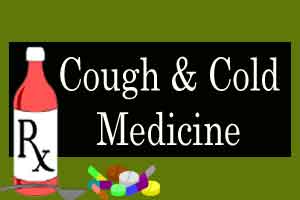- Home
- Editorial
- News
- Practice Guidelines
- Anesthesiology Guidelines
- Cancer Guidelines
- Cardiac Sciences Guidelines
- Critical Care Guidelines
- Dentistry Guidelines
- Dermatology Guidelines
- Diabetes and Endo Guidelines
- Diagnostics Guidelines
- ENT Guidelines
- Featured Practice Guidelines
- Gastroenterology Guidelines
- Geriatrics Guidelines
- Medicine Guidelines
- Nephrology Guidelines
- Neurosciences Guidelines
- Obs and Gynae Guidelines
- Ophthalmology Guidelines
- Orthopaedics Guidelines
- Paediatrics Guidelines
- Psychiatry Guidelines
- Pulmonology Guidelines
- Radiology Guidelines
- Surgery Guidelines
- Urology Guidelines
Number of prescriptions of cough and cold medicines in children under 12 declining: JAMA

USA: Physicians are less likely to prescribe cough and cold medicines (CCM) to children under 12 with respiratory infections, suggests a recent study in the journal JAMA Pediatrics. This is due to the growing recognition that these medicines might be ineffective and may lead to potentially harmful or fatal side effects. In turn, the physicians are increasingly more likely to recommend antihistamines.
Antihistamines are widely used over-the-counter to treat various allergic conditions. However, these medicines have little known benefit for children with colds, and some older antihistamines cause sedation and occasionally agitation in children.
In 2008, the US Food and Drug Administration (FDA) advised against the use of over-the-counter (OTC) CCM in children younger than 2 years owing to concerns about its safety and efficacy. Soon after, drugmakers advised against cough and cold drugs for kids under age 4. The American Academy of Pediatrics recommended avoiding CCM in children younger than 6 years.
To find out how these recommendations have impacted doctors’ prescribing habits, Daniel B. Horton, Department of Pediatrics, Rutgers Robert Wood Johnson Medical School, New Brunswick, New Jersey, and colleagues studied trends over a broader timeframe in physicians’ recommendations for CCM and, for comparison, antihistamines in the US pediatric population.
The researchers looked at national surveys representing 3.1 billion pediatric ambulatory clinic and emergency department visits in the United States from 2002 to 2015. During that period, physicians ordered approximately 95.7 million cough and cold medications, 12 percent of which contained opioids.
"Families often treat their children's respiratory infections with cough and cold medicines, some of which include opioid ingredients, such as codeine or hydrocodone. However, there is little proof that these medications effectively ease the symptoms in young children," said Dr Horton. "Also, many cough and cold medicines have multiple ingredients, which increases the chance of serious accidental overdose when combined with another product."
After the FDA's 2008 public health advisory, however, physician recommendations declined by 56 percent for non-opioid cough and cold medicines in children under 2 and by 68 percent for opioid-containing medicines in children under 6. At the same time, researchers saw a 25 percent increase in doctor recommendations for antihistamines to treat respiratory infections in children under 12.
"Sedating antihistamines such as diphenhydramine [Benadryl] may have a small effect on some cold symptoms in adults," said Horton. "However, there is little evidence that antihistamines actually help children with colds feel better or recover faster. We do know that these medicines can make kids sleepy and some kids quite hyper."
"It is nice to see physicians are heeding the advice to avoid cough and cold medications for children, but switching them to antihistamines is not necessarily an improvement," said co-author Brian Strom, chancellor, Rutgers Biomedical and Health Sciences.
The American Academy of Pediatrics has various suggestions for treating children with the cold or flu, including use of over-the-counter medicines for pain or fever, honey to relieve cough in children over 1-year-old and plenty of rest and hydration.
To read the complete study log on to doi:10.1001/jamapediatrics.2019.2252

Disclaimer: This site is primarily intended for healthcare professionals. Any content/information on this website does not replace the advice of medical and/or health professionals and should not be construed as medical/diagnostic advice/endorsement or prescription. Use of this site is subject to our terms of use, privacy policy, advertisement policy. © 2020 Minerva Medical Treatment Pvt Ltd